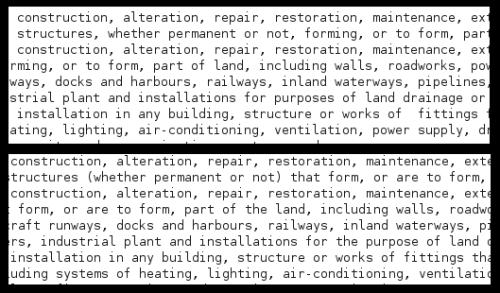Singapore’s handsomely remunerated law-makers have on occasion claimed to be so busy running the country that they couldn’t pause even to hold elections. If this is true, one wonders where their hours are spent. Revelations today hint that writing legislation is not the answer. A look at the wording of the Building and Construction Industry Security of Payment Act indicates that significant tracts of that document appear to have been taken, almost word for word, from Australian legislation of the same name. Legislation first passed into law in New South Wales five years before it hit Singapore’s statute books. Is this a case of “plagiarism in parliament” or is there a more innocent explanation?
While researching my previous article on breaches of law in the Prime Minister’s Office, it suddenly dawned on me that I was reading not the Singaporean but the Australian Building and Construction Industry Security of Payment Act. Since the PMO had been found by the Auditor General to have broken a law of that name on a local construction project, it must be the case that both countries have legislation, at the very least, under the same title. After looking more carefully into the details of the legislation, it soon became clear that both countries’ legislation share quite a bit more than just the title. So much so, that there is an obvious inference that significant sections of the law have been copied – apparently from Australia to Singapore.
The above image shows a relatively small snapshot of the similarities between the two statues. Larger extracts from the Australian and Singaporean legislation show the extent of the similarities. These extracts are formatted by myself to highlight the substantive similarities – taking two paragraphs, on the definition of the phrase “construction work” as an example:
(b) the construction, alteration, repair, restoration, maintenance, extension, demolition or dismantling of any works forming, or to form, part of land, including walls, roadworks, power-lines, telecommunication apparatus, aircraft runways, docks and harbours, railways, inland waterways, pipelines, reservoirs, water mains, wells, sewers, industrial plant and installations for purposes of land drainage or coast protection,
(c) the installation in any building, structure or works of fittings forming, or to form, part of land, including heating, lighting, air-conditioning, ventilation, power supply, drainage, sanitation, water supply, fire protection, security and communications systems,
Australian Building and Construction Industry Security of Payment Act 1999
(b) the construction, alteration, repair, restoration, maintenance, extension, demolition or dismantling of any works that form, or are to form, part of the land, including walls, roadworks, power-lines, telecommunication apparatus, aircraft runways, docks and harbours, railways, inland waterways, pipelines, reservoirs, water mains, wells, sewers, industrial plant and installations for the purpose of land drainage, coast protection or defence;
(c) the installation in any building, structure or works of fittings that form, or are to form, part of the land, including systems of heating, lighting, air-conditioning, ventilation, power supply, drainage, sanitation, water supply or fire protection, and security or communications systems;
Singaporean Building and Construction Industry Security of Payment Act 2005
Clearly these sections are almost entirely identical, in the terms, in the order they appear and in what they apparently omit. They both for example refer to “docks and harbours”, but not ports or quays. Both refer to “alteration, repair, restoration, maintenance” but not renovation. Both refer to aircraft runways but not helipads. The arbitrary similarities are numerous and it seems clear that this cannot be a co-incidence. Beyond the extracts highlighted, much of the legislation is not in fact identical or even similar, but there are further sections which are almost identical, particularly around the outlawing of “paid when paid” provision in contracts.
The main question in my mind has to be “is this normal”? Do countries regularly, or Singapore particularly, copy and paste legislation from each other’s statute books? The similarities are not necessarily indicative of lazy or sloppy lawmaking, but they do little to instill confidence that Singapore’s ministers are working hard enough to deserve their exorbitant salaries. Have the terms and conditions taken over from Australia been suitably scrutinised for applicability in the context of other Singaporean statues and also case-law? It should be noted that Singapore’s law-makers have inserted terms for example to include land reclamation in the legislation, so some attention has clearly been given to the question. However I couldn’t avoid the nagging doubt that copying overseas law is the right way to go about things. I’m sure for example that Singapore’s ruling party would reject out of hand copying legislation on freedom of speech or election regulations from Australia – so why do so in the case of more mundane building regulations?

Copying the legislation, even word for word, of other jurisdictions, is an accepted practice worldwide. If you are to look at the Bills presented to Parliament, often you will find at the end the reasons for the Bill and the sources of the various provisions. It is a sensible practice to learn from one another,s experience. I am afraid you are barking up the wrong tree.
Thanks, that is interesting to know. I tried to make the article more questioning than accusatory since I figured laws could be considered as in the “public domain” and this might be more common practice than I realised. I am afraid it will be very tedious to find more examples though…